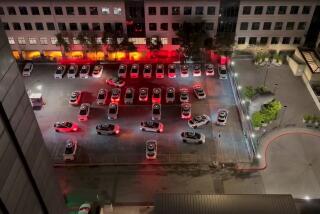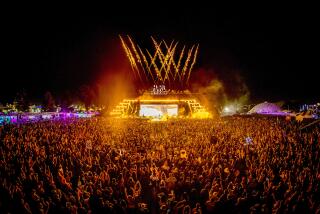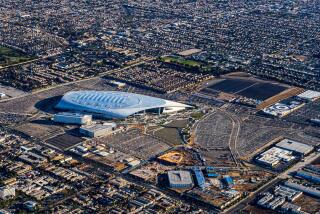Hear Ye, Hear Ye! N.Y. Tones Down
- Share via
NEW YORK — Even a downpour could not dampen the din Friday night along Bleecker Street in Greenwich Village, a block singled out by city sound enforcement officers as one of the noisiest in this cacophony capital.
The storied street of bars and blues and boozy midnights was alive with shrieks as umbrellas blossomed in front of the Bitter End, the Peculiar Pub and other haunts that, for tourists, make this block a synonym for a raucous good time and, for neighborhood activists, a never-ending source of noise complaints.
“You want quiet? Go to Brooklyn,” said Reynaldo Gayle, a genial bouncer wearing a “Don’t Judge Me” T-shirt in front of the Asylum. “This is the strip where people come to make the noise.”
An impatient taxi driver, hemmed in by a white stretch limousine and a throng of distracted barhoppers, honked his horn a little too enthusiastically in the post-midnight hours. Three New York policemen swooped out from under a nearby awning and surrounded the hapless driver.
Busted.
The driver was caught up in Operation Silent Night, New York Mayor Michael R. Bloomberg’s war on barking dogs, blaring stereos, unmuffled motorcycles and the bleary bellow of tourists who are loving New York too loudly. To crack down on noise pollution, Bloomberg this month targeted 24 neighborhoods for stepped-up enforcement of noise ordinances. He also ordered the city’s antiquated noise laws strengthened.
Noise has become one of America’s top neighborhood complaints, from protests about the roar of snowmobiles in the wilderness of Yellowstone National Park to well-mannered spats about weed whackers in San Marino. Several experts say noise in urban areas has grown sixfold in the last 15 years. There are more planes overhead, more helicopters, more cars honking, more trucks grinding gears, more beepers, more ringers, more buzzers and bells. In New York, complaints are running well ahead of last year, totaling 93,000 so far.
City officials launched the noise crackdown to improve New York’s quality of life, but health officials point out that all the noise is doing more than keeping residents awake in the city that never sleeps.
“Noise is not just an annoyance; it is a health hazard,” said psychologist Arline Bonzaft, a member of the New York Council on the Environment.
New research has found that noise poses a collection of health consequences beyond hearing damage: elevated blood pressure; increased risk of heart attacks; increased levels of destructive stress hormones; skewed mental abilities and mood; dulled long-term memory; impaired speech perception; and shortened attention spans. Women are less able to ignore unwanted noise than men, researchers at Texas A&M; University have found.
And children may face lifelong problems from exposure to even low-level noise, researchers at Cornell University have discovered in the first study of its kind.
Excessive noise seriously interferes with children’s ability to learn, a Cornell environmental psychologist and his colleagues recently concluded after studying children living near European airports. Relatively low levels of noise, including traffic, were enough to damage reading abilities and memory, as well as raise blood pressure and stress hormones in children.
“Noise exposure is consistently linked to reading deficits and may interfere with speech perception and long-term memory in primary school children,” said Cornell’s Gary Evans, whose most recent findings were published by the American Psychological Assn. in the September issue of Psychological Science.
“The typical public health response to noise is to see if it damages hearing, but that is only the tip of the iceberg,” Evans said.
Even so, the hearing damage caused by too much noise also appears to be worsening every year, according to research by the New York-based League for the Hard of Hearing.
The group, which has screened 100,000 people over the last 19 years, found that more people failed the hearing tests every year in every age group. Increasing noise pollution may be the cause, the organization believes.
Indeed, almost all of the hearing problems so common among the elderly may be nothing more than a lifetime effect of too much noise, research suggests. Studies of people living in less industrialized, more bucolic conditions show that hearing loss among the elderly is virtually nonexistent.
“Much of what we think of as hearing damage due to natural aging is not,” said Nancy Nadler, director of New York’s Noise Center. “It is the lifetime exposure to noise. It all adds up over time.”
Growing worries about the health effects of too much noise are turning America into a nation of sound-deadening windows, highway sound walls, office acoustic baffles, white noise machines and noise-canceling headphones.
To find peace and quiet, people fight noise with noise. They don stereo headphones, turn up the television or crank up the car stereo. In the same spirit, acoustic designers turn up the music to create a mood or to muffle street noise. People stand on the sidewalk to shout on cell phones because they can’t hear indoors. Construction racket and traffic rumble drown out their conversations.
“People are inundated with sound,” said Bonzaft. “The world has gotten noisier.”
By attacking neighborhood noise, New York officials say they are trying to darn the fraying fabric of urban civility. “Noise complaints in New York City are increasingly an indicator of a lack of civility and urban disorder,” said Christopher O. Ward, commissioner of the city Department of Environmental Protection.
In less than two weeks, police have issued 159 summonses for noise violations, which can bring fines up to $25,000 for the most serious repeat offenders.
But for some people, noise does have its proper place.
Bleecker Street may be one of them.
“This is a loud block, no question,” said Paul Rizzo, collecting the cover charge under the blue canopy of the Bitter End, which as New York City’s oldest rock club has been making local noise since 1961.
There were six live bands on the show list Friday night and four policemen across the street keeping an ear to the noise levels. A precinct police captain already had asked Rizzo once to quiet down.
“As far as noise goes, this is Greenwich Village,” Rizzo said, “not Greenwich, Connecticut.”
More to Read
Sign up for Essential California
The most important California stories and recommendations in your inbox every morning.
You may occasionally receive promotional content from the Los Angeles Times.










